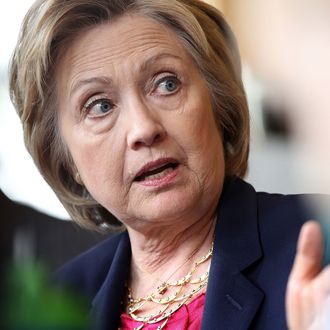
With Bernie Sanders winning yet another primary (in West Virginia) well after most pundits have concluded Hillary Clinton has all but locked up the Democratic presidential nomination, it’s natural for there to be some speculation that her late-primary performance may portend a lack of momentum that could haunt or curse her in the general election. For one thing, the “Big Mo” argument is central to Bernie Sanders’s forlorn message to superdelegates. For another, Republicans are using Clinton’s primary fade along with some very dubious general-election polling to counter doom-and-gloom fears about their unlikely new nominee, Donald Trump. “Hillary Clinton is unraveling quickly,” chortles New York Post columnist Michael Goodwin.
Now, this is all obviously a bit absurd, since the general election is nearly six months away, with conventions, debates, and billions of dollars in paid media still ahead. It’s a bit like judging the postseason “momentum” of Major League Baseball teams based on their current early-season records. But for the record, there’s no particular correlation between late-primary performance in contested nomination contests and success in general elections.
Sure, most nominees win late primaries because their opponents have dropped out. But when they don’t, the ultimate winner doesn’t necessarily have a cake walk.
The obvious example is Barack Obama, who after May 1, 2008, lost primaries to Hillary Clinton in Indiana, West Virginia, Kentucky, Puerto Rico, and South Dakota. His loss in West Virginia was by 39 points, compared to Clinton’s 15-point loss in the same state this year. And he lost Kentucky by 36 points. Somehow he managed to recover by November.
There’s earlier precedent for a late-primary fade leading to a general-election win. In 1976 after May 1, Jimmy Carter lost to Jerry Brown in Maryland, Nevada, and California, and to Frank Church in Nebraska, Idaho, Oregon, and Montana. He somehow regained “momentum” and won the presidency.
Carter also, however, provided a counterexample in 1980, when Ted Kennedy beat him in five June primaries. He did indeed go on to lose in November, but a lack of late-primary “momentum” probably had less to do with the results than the fact that he was an incumbent president with terrible economic numbers dealing with a hostage crisis and the partisan realignment of his home region. And he was facing Ronald Reagan rather than Donald Trump.
Matter of fact, even Reagan wasn’t entirely immune to the late-primary swoon. In 198o, he lost a late-April Pennsylvania primary and a late-May Michigan primary to Poppy Bush. I don’t know if there were columns headlined “Reagan is unraveling quickly,” but spin wasn’t invented yesterday.






























